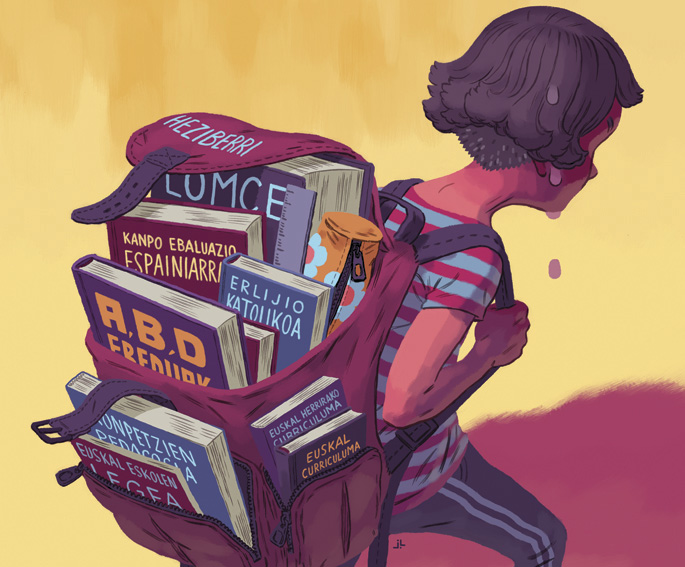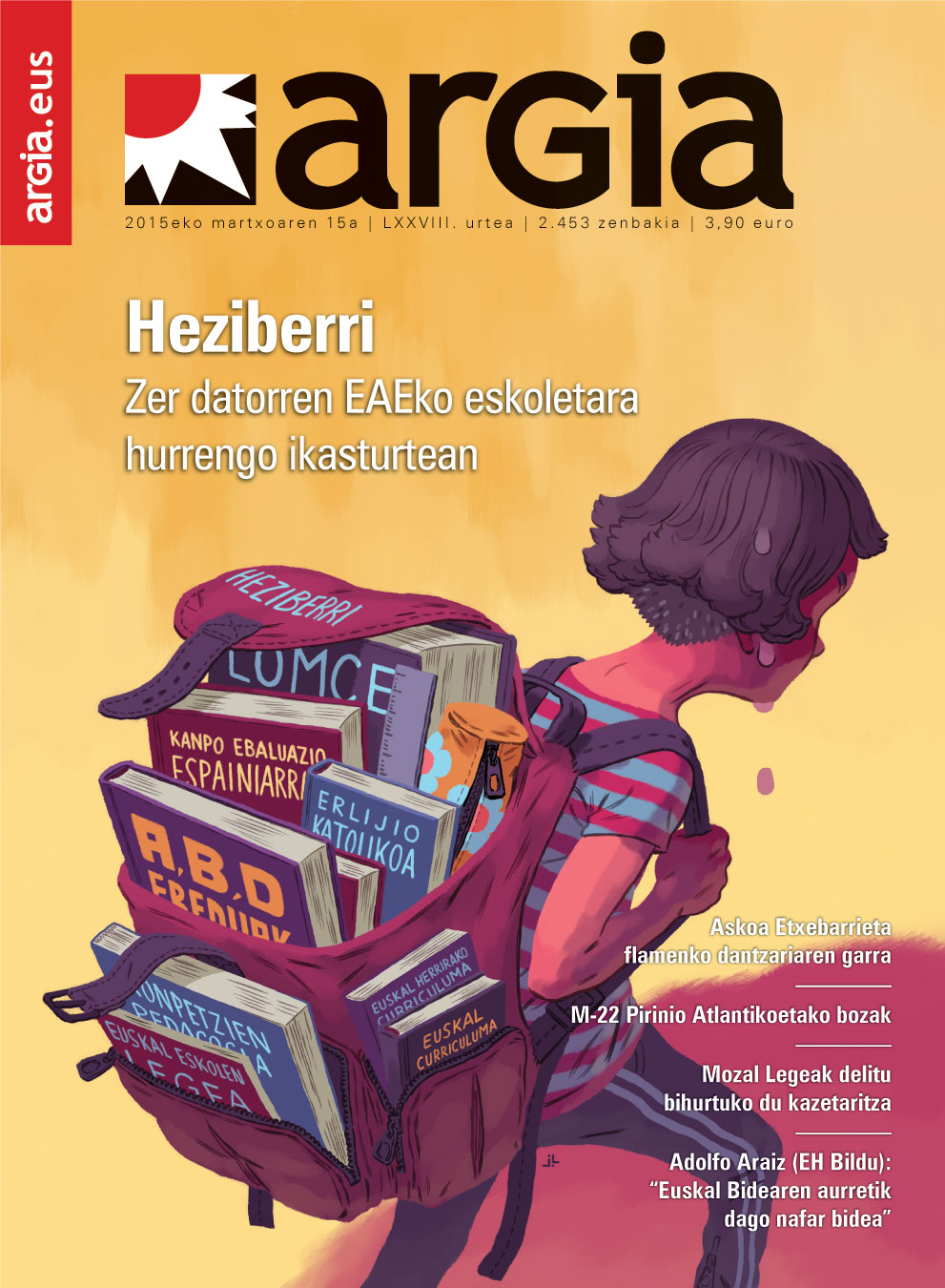In the face of the LOMCE, what has the government curriculum achieved and what has not?
- The curriculum presented by the Basque Government for the CAV will be launched the next course in Primary Education, and Secondary Education 2016-2017. What does the curriculum collect and how are they going to implement it in schools? What level of management and autonomy does it give to educational centers? If the LOMCE is abolished in the coming years, will the Basque Government's curriculum be maintained? What controversy has been revealed by the Basque School Act being drafted?

Heziberri 2020 was born with the objective of dealing with the LOMCE, promoted by the Department of Education of the Basque Government. From the Department of Education we have been informed that before the Spanish law, a proper educational project has been developed and that it has had the collaboration and consensus of the agents of the sector. Instead of taking part in the process, some trade unions and agents have complained that they have debated what was presented by the Basque Government – the students have criticised the lack of student representatives – and have denounced that Heziberri takes on many lines of the LOMCE. The management model, the autonomy and financing of the educational centers, the pedagogical framework and the curricular contents to be worked on have already been defined in Heziberri and have taken a second step: everything included in the decrees. Everything is therefore ready for these decrees to be implemented in schools from next year. The third step is then started: Law of the Basque School which will be developed within Heziberri and which has already sparked sparks. But let's go step by step.
Management and autonomy of the centres
LOMCE concentrates management power on the director, relegating the influence capacity of the educational community and the School Council at the consultation level. The Basque Government has signed an agreement with the central government for the School Council to maintain the competences it currently has in the CAV, as Heziberri has stated.
Heziberri also recognizes the autonomy of the educational centers, but to do so, the school will have to present its project, and the administration will be in charge of evaluating and authorizing it, using the performance indicators. “We would value autonomy as positive if these management competencies (staff, financial, resources…) were understood together and not as compensation for concrete projects, as for a few schools there is a risk of creating educational centers with different speeds,” says Iñigo Salaberria, a member of Sarean, an association that brings together the Directors of Early Childhood and Primary Education of the public school. “Instead of providing more resources to those who have the most difficulties and needs to achieve the same goal, allocating resources and funding according to the center’s project and the objectives achieved by it is not to give autonomy, it is to cheat”, says Ana Pérez, of the STEILAS union.
Heziberri has criticized the fact that in education the public service is offered by both public and concerted schools, since he considers that the priority of the educational system must be recognized to the public school. “The decrees do not propose the co-responsibility of all networks and the zonal equalization of students to provide an adequate response to students of different characteristics, needs and origins.” They have therefore denounced that, both in terms of language and in terms of needs, diversity and socio-economic level, public schools often become ghettos.
Part of the LOMCE-conditioned curriculum
“The role of the curriculum is to contribute to the acquisition of basic competencies for life. And in addition to the integral development of the person, the structuring of what binds us socially and lays the foundation for coexistence,” explains Heziberri’s leader. To this end, he said, they have taken as their main source the Basque Curriculum and the Curriculum for the Basque Country, or rather, the Official Curriculum Decree of the CAPV of 2007, which is the combination of both curricula (see table on the next page). They have incorporated basic and transversal competences or competences, such as the ability to face problems, communicate, learn to learn and think, the competence for coexistence or the spirit of initiative and action, which STEILAS considers not to be related to the philosophy of education, but to the vision of the business world and the market. In subjects, mathematics and languages (Basque, Spanish, foreign language) are the ones that take the most hours, and they are the ones that have priority to overcome the course.
Asked about the extent to which LOMCE has conditioned the curriculum, the authors point out that the background is not conditioned by: “The educational model, what kind of students we want to educate, is not by far the one of the LOMCE, but ours. And that's the key. We have defined what type of house we want to build, among them (they are our teachers) and with what material: they want to condition the latter, but we have somehow avoided it”. And it is true that at some point Heziberri has faced the Spanish law: According to LOMCE, for example, young people have to decide between university and vocational training at the age of 14, and from there students will follow different paths, but in the CAV they will follow the same curriculum (in total more subjects will be taught than in Spain) to delay the decision until the age of 16.
On the other hand, Heziberri has internalized some of the requirements of the LOMCE and underlined this in the Ikasle Abertzaleak Network, EHIGE, BIHE, LAB, ELA and STEILAS, among others. “In many points reference is made to the ‘current law’, indicating that the achievement indicators set by that law will have to be met, and the current law is the LOMCE, therefore…”, Ana Pérez said.
Heziberri has recognized that the external or revalid evaluations established by the LOMCE in 3 and 6 Primary will be diagnostic evaluations in the CAV, so they should not have academic effects at first, but the concern of primary school principals is the main: “We hope that the activities of the centers will be adapted to these exams,” says Iñigo Salaberria-, in order to achieve the highest level of achievement, which would harm the methodological pedagogical evolution of them over the years”. Although it is a diagnostic evaluation, if the teachers themselves expect these tests to condition the learning process in Primary Education, imagine the effect of the external evaluation that the students will have to overcome in order to be able to access the Baccalaureate at the end of Compulsory Secondary Education. In fact, Heziberri has an obligation to overcome a macro-examination that measures certain criteria and contents, and that is prepared from the outside, although the word “revalid” referred to by the LOMCE is eluded. Will the teaching of these contents for the categorisation of compulsory evaluations allow other aspects to be worked out? Let us remember that selectivity, for example, leaves no time for anything in the Baccalaureate. In addition, according to STEILAS, forcing students to constantly value what they learned in the external tests and to compete with the rest is not the most appropriate evaluation system.
Catholic religion will also be compulsory, according to Heziberri – and the LOMCE –. Those who do not opt for the choice of religion should receive the matter of civic and ethical values, both being evaluated at the level of the rest of the subjects.
The treatment of languages has also led to the anger of some of them. Models A, B and D will be maintained in the centres, although agents have long insisted that models A and B should not euskaldunize and that the system of models should be overcome. Moreover, Heziberri states that the profile of Euskera is based on the social environment of the center and many agents have not seen it with good eyes, as he believes that it can re-create centers of different speed and ghettos, instead of demanding the same objective for all people of the knowledge of Euskera and put resources in areas most in need for it. “We see the lack of courage to take decisive steps in the process of Euskaldunization,” said Sarean, a member of the association.
Also at ikastolas, Heziberri?
At the initiative of the ikastolas, Udalbiltza and Sortzen Ikasbataz developed the Basque Curriculum a decade ago (see above). table on the page). The Eki teaching material is a development of this curriculum and the ikastolas are based on that same objective. It has been tested on some levels and is now spreading to other age ranges. “Doubts arise, because teaching is undergoing a major paradigm shift based on competencies, but gradually we are moving forward,” says Koldo Tellitu, president of the Ikastolas Federation. Tellitu added that Heziberri has also carried out a competency-based curriculum development and that it has overcome the academic vision of the LOMCE: “The execution of Heziberri has to be done in each center and opens a door not to apply the LOMCE; we believe that we can take advantage of that door that we have opened, following with Ekin and developing the Basque Curriculum.” He has acknowledged, however, that Heziberri does not have enough strength to stop the LOMCE, “and that is evident in Secondary, and especially in the area of evaluations.” After all, it is clear that the revalid ones will condition the teaching, but the circumstances of those revalid “are unknowns of the moment,” says Tellitu, because the Spanish Government has not yet made any proposal for evaluation.
The Minister of Education, Cristina Uriarte, has stressed that the decrees developed in Heziberri (see interview on the next page) will be kept in the background, even though pp loses an absolute majority in the Spanish elections and opposition parties – as has already been said on several occasions – refuse LOMCE or at least external evaluations. In case the LOMCE is suspended, it is not a fund, but it is to be hoped that some contents of the curriculum can be modified; however, the management and autonomy section of the centers worries Ana Pérez, who wanted to do it quickly and whose intention is to shield them.
The Basque School Law, a thorny challenge for the coming years
In 1993, the Basque Government enacted the Basque Public School Act for the renewal of the public school and the integration of the ikastolas. Many ikastolas, which combined 40% of the students of the ikastolas of the CAV, decided to publish the project. Currently, 50% are public centers in the CAPV and 50% are “private” – all private ones are concerted, except two or three centers. In Europe, only 10% are private centers, on average.
To adapt to the new times and build their own educational system, everyone needs an education law. This will be Heziberri's next step, starting with his decrees. The main challenges faced by the law are clear to the agents: regulating the autonomy of the educational centers, favoring the stability of the faculty, structuring a multilingual system centered on the Basque language, overcoming the current system of models, reflecting a curriculum based on competences and guaranteeing the equality of opportunities and inclusiveness of the students.
The hotspot will undoubtedly be a public and concerted debate. “We see that in the Law there is no intention of the public school being the axis and so it should be. It seems that the administration does not believe in public school; at the CAPV we have the minimum percentage of public schools and it is essential that society decide whether we want the public school in this country to be the axis of the educational system or secondary school – said the spokesman for the mothers and fathers association EHIGE –. The co-responsibility of the networks is fundamental, because within the Law private centers will ask for more funding, but it is not possible to do and concentrate all the special needs in the public school”. “We feel that the administration is more committed to the ikastola than to the public school,” said STEILAS spokesman.
The ikastolas and the Christian School are awaiting a regulation that will give them legal stability and give them stability. Define what is the public, that is where the president of the Federation of Ikastolas sees the key: “Only half of the schools in the education system have law and it is important that there is law for the entire education system. The debate on what public education system we want will be fundamental: we have called for new advertising, not linked to ownership but to service, and on that basis, a new funding system. A conflict will be generated, because there are obvious differences in approaches and educational models we will have to do a job where each one has its red lines and where we can approach each other. Let’s see if we among all are able to implement our advertising system, because what we have today is a copy of the Spanish and French public system.”
.jpg)
Cristina Uriarte: "We have competence, and it is enough; another thing is to what extent the Spanish Government fails to fulfil our competences" (Photo: Juan Mari Aburto (White) .Dani Blanco)
Euskal Curriculuma eta Euskal Herrirako Curriculuma, proiektu nazionalak
1996an, Ikastolen III. Batzar Nazionalean erein zen Euskal Curriculumaren hazia, Xabier Garagorri Ikastolen Konfederazioko aholkulariaren zuzendaritzapean –Heziberriren gidaritza taldean ere aritu da Garagorri–. Sortzen Ikasbatuaz eta Udalbiltza batu ziren ondoren egitasmora, eta aditu ugariren laguntzaz, ikasleak “Euskal Herriaz eta munduaz ezagutu beharrekoa, egiten jakin behar duena eta izan behar dituen baloreak” zedarritu zituzten. 2005ean aurkeztu zuten emaitza: Derrigorrezko Eskolaldirako Euskal Curriculuma, besteak beste Eusko Jaurlaritzako Hezkuntza Sailak eta Kristau Eskolek ere babestua. Sarean, BIHE eta EHIGE eskola publikoko eragileek, ordea, beste proposamen bat aurkeztu zuten: Euskal Herrirako Curriculuma. “Ikuspegi sozialagoa duen curriculuma osatu genuen, sozio-kritikoagoa, erlijioari adibidez ez diogu aipamenik egiten”, dio EHIGEko Lurdes Imazek. Bi curriculumen uztarketatik jaio zen EAErako Oinarrizko Hezkuntzaren Curriculuma, 2007an dekretu bidez onartua eta gaur arte indarrean izan dena.
Soraluzen eta Orion, herrirako hezkuntza proiektuak
Euskal Curriculumari oriotarren ikuspegia txertatu asmoz, lehenengo fasea amaitu du Orioko Curriculuma Sortzen taldeak: arlo anitzetako herri eragileekin bildu, hitz egin eta haien ekarpenak jaso dituzte. Udalak, kirol eta kultur esparruko jendeak, herriko ikastetxeek, talde feministak, gaztetxeak, aisialdi taldeak, musika eskolak, natur taldeak, dantza taldeak… hartu dute parte. Bildutako informazioarekin, herriko bi ikastetxeetan Orioko Curriculuma taxutzea dute helburu.
Soraluze biziberritzeko oinarriak jarri nahi dituen ekimena da Alkarrekin Soraluze Eginez. Prozesu herritar horren baitan, Herriko Hezkuntza Proiektua abiatu dute, “herritik herrirako egindako hezkuntza proiektua”, Arantza Mata Egiguren Soraluzeko herri ikastetxeko zuzendariaren hitzetan. Hezkuntza Mahaia izeneko asanbladetan, herriko bizilagun, eragile eta elkarteak ari dira parte hartzen, eta bilerak egiten ari dira talde jakinekin (ikasleak, irakasleak, gurasoak, hezitzaileak, aisialdi taldeak, atzerritarrak…). Hartu-eman horietatik guztietatik proiektua garatu, herritarrekin emaitzaren inguruko eztabaida saio irekia antolatu eta apirila bukaerarako txostena publiko egitea da asmoa.
Antzuolako eskolak curriculum propioa
1981ean herriko ikastola eta ikastetxe publikoa batu zirenetik, eskola bakarra du Antzuolak, “herriaren barne-kohesiorako eta eskolarentzako onuragarri”. Curriculuma ulertzeko modu propioa daukatela diote, curriculum irekia, partaide guztien ahots, ideia eta egiteko moduak aintzat hartzen dituena. Ikastetxearen hezkuntza proiektuaren oinarri dira ikaslearen dimentsio intelektuala, emozionala eta harremanezkoa; mundua eta norbere burua ulertzeko lagungarri izango den ezaguera eta kultura irakastea; eta aniztasunari eta ikasle guztien ideiei garrantzia ematen dien giroa. Proiektua garatzeko autonomia nola lortzen da? “Borrokatuz”, erantzun digu Axun Mujika irakasleak: “Taldearen egonkortasunak garrantzi handia dauka, dudarik gabe, eta garrantzitsua da familien inplikazioa, hori lortu ahal izateko. Partaide bakoitzaren eta guztien konpromisoa, gogoa, emozioa, jakin-mina… ezinbesteko osagaiak dira. Gauzak beste modu batean egitera ausartzen garenean, aurkikuntza asko egiten ditugu, emozioz betetako aurkikuntzak. Bide horretan jarriz gero, ez dago atzerabueltarik. Horrek indarra ematen digu proiektua defendatzeko, gure lan egiteko modua argudiatzeko”.
Espainiako hauteskundeen emaitzaren arabera etorkizunean LOMCE edo kanpo-ebaluazioak kenduko balira, Heziberriko dekretu batzuk aldatzeko aukera legoke?
Dekretuetan garrantzitsua da bi irizpide uztartzeko egindako ahalegina: berme juridikoa ziurtatzea batetik eta Espainiako Estatuak ezartzen duen oinarrizko araudia saihestea bestetik. Estatuak ezarri asmo dituen errebaliden aipamenik ez da egiten dekretuan eta artikulatua baliagarria da bai LOMCErekin bai hura gabe. Orain arte gure hezkuntza sistemak garatu dituen lorpenak mantentzen edo indartzen dira dekretuetan (autonomia edo aniztasunaren gaietan, adibidez). Beraz, Heziberri Planean garatu diren Curriculum dekretuak, hauteskundeetako emaitzak alde batekoak ala bestekoak izan, funtsean mantendu egingo dira.
Hezkuntza arloko eragile gehienen desadostasuna du Heziberrik. Nola baldintzatuko du horrek EAErako curriculumaren etorkizuna?
Orain arte, EAEn dekretuak garatzeko egindako saiakeretan ez da prozesu honetan bezainbesteko parte-hartzerik izan. Adostasun maila ia erabatekoa izan da hezkuntza eredu pedagogikoan, eta eragileen ekarpen gehienak dekretuen artikulatuan uztartu dira. Uztartu ez direnak, gehienak dira beste araudi batzuetan finkatzen direlako, dekretu hauen garapenak direlako edo Hezkuntza Legean sartuko direlako. Ohikoa da, dena den, desadostasunak adostasunak baino gehiago azpimarratzeko joera, arrazoi ezberdinengatik. Gainera, desadostasun handienek Estatuak ezarri duen eta gure eskumenak mugatzen dituen oinarrizko araudiarekin dute zerikusia. Hala ere, muga hauek ez dira oraingoak eta beti jakin izan dugu oztopo horiek gainditzen.
Euskal Eskolaren Legea izango da hurrengo urteetako erronka handia. Sindikatu batzuek salatu dute ikastetxe kontzertatuen onurarako eta eskola publikoaren kalterako izango dela.
Gure hezkuntza sistema aztertzen badugu, logikoa da hezkuntza sistema osoa batuko duen legea izatea, ez du inongo zentzurik sistemaren erdia kanpoan uzteak. Azken finean, sare publikoak eta kontzertatuak, bakoitzak bere ezaugarriak galdu gabe, sistema bateratua osatzen dute. Aipatu dituzun salaketek ez dute oinarririk, Heziberrin ez dago inolako lorratzik horrelako susmoa pizteko. Alderantziz, dekretuak bermatzen ditu ekitatea mantentzeko eta areagotzeko orain indarrean dauden neurriak. Ekitatearen printzipioa euskal hezkuntza sistemaren ezaugarri sendoenetakoa da eta ez dugu inolaz ere zalantzan jartzeko asmorik.
Lege berriak alderdien adostasuna lortuz gero, bermea litzateke Espainian erabakitzen diren hezkuntza legeekiko autonomo jokatzeko?
Alderdien adostasuna lortzea oso garrantzitsua litzateke, eta beharrezkoa. Adostasuna zenbat eta zabalagoa izan gure artean, hezkuntza sistemaren sendotasuna orduan eta handiagoa litzateke barrura begira, eta indartsuago azalduko litzateke oinarrizko araudiaren aurrean. Horregatik, komeni da alderdien ikuspegi partikularren gainetik guztiok elkartzen gaituen begirada zabala izatea. Eskumena badaukagu, eta nahikoa; beste gauza bat da Espainiako Gobernuak noraino urratzen dituen gure eskumenak.
Luis Dorao, San Martin, Lukas Rei, Barandiaran, Umandi… Arabako 27 ikastetxe hauetatik 19 publikoetan egin nahi ditu frogak Eusko Jaurlaritzak martxoaren 5etik aurrera Lehen Hezkuntzako 6. mailako ikasgeletan. DBHn ere Pisa azterketa egitera deituko dituzte 4. mailako... [+]
Ebaluaketak "merkatu eta politika neoliberalen menpe" daudela kritikatu du sindikatuak eta proba "jarraitu eta hezigarrien" aldeko dokumentua aurkeztu du.
Hezkuntza arloan, Hego Euskal Herrian LOMCE legeak markatu du azken urteetako dinamika eta epe laburrean behintzat hala izaten jarraituko du. Hala, ikasturte honetan ere, Jaurlaritzaren Heziberri planak eta bestelako adabakiek puntu batzuen eragina arindu arren, Madrilen... [+]
Jaio aurretik kontra ditu eskola publikoko ordezkariak, eztabaida piztu du ikastolen eta eskola publikoaren artean, eta arautuko dituen hainbat punturekin ez datoz bat eragileak. EAErako Hezkuntza Legea bero dator. Hona afera ulertzeko gakoak.
LOMCE legearen hemendik aurrerako aginduak impassean utzi eta “itun nazionala” iragarri du Espainiako presidenteak. Edo beste era batera esanda, PP, Ciudadanos, PSOE eta ahal balitz beste alderdi txikiagoren baten babesa bilatuko duen hezkuntza lege berri bat,... [+]
Milaka lagun Hego Euskal Herriko hiriburuetan egin diren manifestazioetan, eta lanuzte eta protestak ikastetxe askotan. LOMCE eta Heziberriren aurka eta hezkuntza sistema propioaren alde egindako mobilizazioen balorazio "oso positiboa" egin dute deitzaileek:... [+]
"Azaroaren 24an, EHUko errektoretzarako hauteskunde egunean, Leioako campusa ikasle haserrez beteko dugu –iragarri dute Ikasle Abertzaleek–, EHU instituzio burges eta zapaltzaile gisa errefusatzen dugula argi adierazteko, eta ikasle boterearen artikulazio bidez... [+]
"Legegintzaldi honetan EAErako Hezkuntza Legerik onartzen ez bada, porrot itzela izango da, guzti-guztiontzat". Hala mintzatu da Koldo Tellitu Ikastolen Elkarteko lehendakaria, ikastolen hasiera ekitaldian.
Kanpo-azterketa berriak, aldaketak ikasgaietan, ingelesezko ordu gehiago, ebaluaketa irakasleei, mugimenduak goi-karguetan… Bero dator ikasturtea Hego Euskal Herrian, LOMCE, Heziberri, Ingelesez Ikasteko Programa edota D ereduaren zabalkuntza tarteko.
Maiatzaren 27an bukatzen da Lehen Hezkuntzako 3. mailako azterketa polemikoaren emaitzak Eusko Jaurlaritzari jakinarazteko epea. Hezkuntza Plataformen Topaguneak jakinarazi duenez, 175 ikastetxetan planto egin diote probari eta elkarretaratzeak egiteko baliatuko dute azken... [+]

























